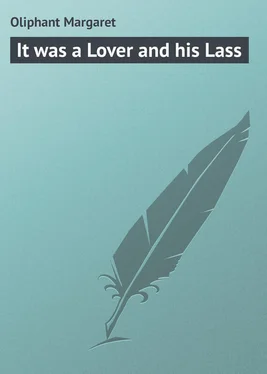Margaret Oliphant - It was a Lover and his Lass
Здесь есть возможность читать онлайн «Margaret Oliphant - It was a Lover and his Lass» — ознакомительный отрывок электронной книги совершенно бесплатно, а после прочтения отрывка купить полную версию. В некоторых случаях можно слушать аудио, скачать через торрент в формате fb2 и присутствует краткое содержание. ISBN: , Жанр: foreign_prose, на английском языке. Описание произведения, (предисловие) а так же отзывы посетителей доступны на портале библиотеки ЛибКат.
- Название:It was a Lover and his Lass
- Автор:
- Жанр:
- Год:неизвестен
- ISBN:http://www.gutenberg.org/ebooks/49597
- Рейтинг книги:3 / 5. Голосов: 1
-
Избранное:Добавить в избранное
- Отзывы:
-
Ваша оценка:
- 60
- 1
- 2
- 3
- 4
- 5
It was a Lover and his Lass: краткое содержание, описание и аннотация
Предлагаем к чтению аннотацию, описание, краткое содержание или предисловие (зависит от того, что написал сам автор книги «It was a Lover and his Lass»). Если вы не нашли необходимую информацию о книге — напишите в комментариях, мы постараемся отыскать её.
It was a Lover and his Lass — читать онлайн ознакомительный отрывок
Ниже представлен текст книги, разбитый по страницам. Система сохранения места последней прочитанной страницы, позволяет с удобством читать онлайн бесплатно книгу «It was a Lover and his Lass», без необходимости каждый раз заново искать на чём Вы остановились. Поставьте закладку, и сможете в любой момент перейти на страницу, на которой закончили чтение.
Интервал:
Закладка:
"Then why should they think so badly of me?" Lewis said.
He did not make any rash proposal to give up the property, as perhaps a hot-headed young Englishman might have done. People who have been brought up abroad have more respect for money in itself than we have. If they do not seek after it so enterprisingly, neither do they separate themselves from it so lightly. There was no indignant flash of a proposal to undo Sir Patrick's will, and prove his disinterestedness beyond a question, in what Lewis said. That would have been foreign to all the habits of his mind. But he grew very grave from that time forth, a mood which suited well enough with his mourning. An intention formed itself in his mind almost immediately, which he did not at once carry out for a number of petty reasons each entirely unimportant in itself, but mounting up together into a certain reasonableness. It was not his grief, for he was young and his patron old, and the natural tears were wiped soon; nor the necessity of settling all his foreign affairs, getting rid of the house, selling or storing up the furniture and pictures, providing for the servants; but there were a number of other small things, including an illness which very naturally followed his long devotion to a sick old man.
At last, however, but not till Sir Patrick had been dead nearly a year, he set off for Scotland to carry out his intention. He was not seduced to London on the way, or to make any acquaintance with the wonders of England. London, to be sure, was growing empty and the season near its end. He came direct from one of the Dutch ports to Leith, and without any pause proceeded to the town which was the nearest, so far as he could make out, to Murkley. One night he had reposed himself in Edinburgh, and one in the "George." It was but three days now since he had crossed the sea, and here he was in Murkley, in the native place of his benefactor, on the very estate which had been his, near the house in which he was born. All this had produced a great effect upon the young man, and so did the conversation with Duncan and the new view of himself and his own conduct suggested by that worthy. Passing gusts of anger and uneasiness had crossed his mind, which were neutralized indeed by the amusing circumstances of his arrival and the novelty of the scene around. But when he had found himself alone that first evening, and the outer world shut out, it could not be denied that the usual peace of his mind was much disturbed. He no longer felt sure of himself, and that tranquil consciousness of having done and of meaning to do his best, which gave serenity to his character, failed him almost for the first time in his life. It was a painful experience to go through, but there was a satisfaction in the thought that he was now on the spot at least, and in the way of ascertaining exactly what the state of the matter was, and how he could best amend it, or if amendment was possible.
This cheering thought and the influence of the morning restored his satisfaction in the external world, and his hopes for what was before him, and the sense of being surrounded with novel circumstances in a new country with everything to learn and to enjoy, restored his spirits. One thing gave him a momentary annoyance, which, however, ended soon in the half mischievous, boyish pleasure which he felt in the expedient he thought of to meet it. The annoyance was his sudden recollection that the name of Lewis Grantley was no doubt well known at Murkley Castle. To allow himself to be known as that detested personage would baffle him in all his intentions. The way of eluding this was a sufficiently simple one, that of dropping his own name. Accordingly he took the first step in conciliating the family by doing the thing of all others at which they were most indignant – assuming the name of Murray, as Sir Patrick had wished. Sir Patrick had expressed a wish on the subject, but it was not mentioned in the will, nor was there any such stipulation made. And Mr. Allenerly had thought it inexpedient. Therefore it had been understood that Grantley he should continue to be. The best disguise he could assume, he felt, was to take the name which would be supposed to be the most unlikely he could hit upon, and yet to which he had a certain right. The idea of doing so amused while it annoyed him. Sir Patrick would have liked it. It would have been a pleasure to the old man; and to himself it would be a shield in this country of the Murrays where every third person to be met with bore the name. If at the same time a sense of deception and unreality crossed the young man's mind, he put it away as a piece of folly. He had nothing but a good meaning in this visit to his adversary's country, to the neighbourhood of the people whom he had wronged without knowing it, most innocently because altogether unawares.
This serious background of thought occupied his mind much while he lay awake in the stillness of the night. But the stillness did not continue long. The darkness was not much more than the twinkling of an eyelid, he thought, and the birds were all awake in a multitudinous chorus, and the sun shining into his room before drowsiness overcame him. At five and twenty, however, a great deal of noise and tumult is necessary to keep sleep away from the eyes, and Lewis, when he got the tangle of his cares unloosened, soon lost consciousness of the birds. And when he woke in the morning and found himself in a new world, with everything about him novel and unfamiliar, amusement and pleasure got the upper hand with scarcely an effort. Let the countryside think what it would of him, he knew himself better, and it would go hard with him, he said to himself, if he did not conquer even the countryside.
CHAPTER III
"Ye'll be for the fushin', sir? Adam, that's my man, will give ye a' the information. He's fell at the saumon; and muckle need to be fell at something," added Janet; "for a mair fusionless man about a house doesna exist. He's no made for an innkeeper. I'm aye telling him that; but I might just as weel keep my breath for ither purposes. It never does him ony good."
"It is all the more to your credit, Mrs. – "
"Oh, you needna fash your head about the mistress. I've aye been Janet, and Janet I'll be to the end o' the chapter. If there had been ony pith in the man, we might, maybe, have risen like the rest of the world; for he's no ignorant, nor yet a gommeral, though ye might think sae to see him: but no pith in him – you would call it spirit, maybe, in English. That's 'the stalk o' carle-hemp in man,' that Robert Burns speaks about. You'll maybe mind? Na, he's no an ill man, but there's nae carle-hemp in him. Sae I have a' upon my shoulders. And, if everything shouldna be just as you wish, it'll be real kind to name it, Mr. Murray. So you're Murray, too? there are a hantle Murrays hereabout. Ye'll be of the Athol family, or – "
"I have lived abroad all my life," said Lewis, "and I have been an orphan since I was very young – so that I know very little about my relations."
He felt very self-conscious as he made this little explanation, and thought it so awkward that he must be found out, but Janet was entirely unsuspicious, and accepted it as a matter of course.
"Eh, that's an awfu' pity," she said, sympathetically; then added, "If ye've been abroad so lang as that, ye'll maybe have met with auld Sir Patrick about the world. That's the grandfather of our misses here – a real grand-looking auld gentleman as ever I set eyes on – but, I'm feared, sir, no sae good as he looked. He's been aye abroad sin ever I mind, and the general and him didna gree; and he has left every penny of his siller that he could meddle with, away frae his family. It's an awfu' hard case," Janet said.
"I have heard something of that: and I think – I have met Sir Patrick."
"I wonder," said Janet, "if ye've seen the lad that did a' the mischief! – a young Frenchman or foreigner he was – that creepit into the auld gentleman's heart, and turned him against his ain flesh and blood. I wouldna have that man's conscience for a' the siller."
Читать дальшеИнтервал:
Закладка:
Похожие книги на «It was a Lover and his Lass»
Представляем Вашему вниманию похожие книги на «It was a Lover and his Lass» списком для выбора. Мы отобрали схожую по названию и смыслу литературу в надежде предоставить читателям больше вариантов отыскать новые, интересные, ещё непрочитанные произведения.
Обсуждение, отзывы о книге «It was a Lover and his Lass» и просто собственные мнения читателей. Оставьте ваши комментарии, напишите, что Вы думаете о произведении, его смысле или главных героях. Укажите что конкретно понравилось, а что нет, и почему Вы так считаете.












